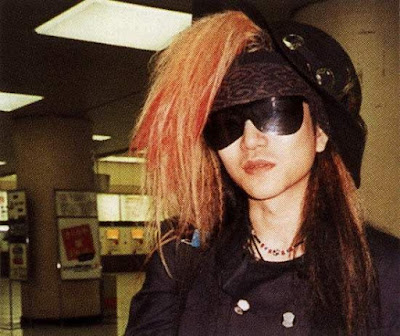Without a moment's hesitation
I now let myself be a piece of meat (2)
The art of blossoming; do I leave it to a future incarnation? (3)
I transform into a creature of physical passions (4)
I fall into pleasure's servitude
Looking back upon myself now, I vomit "life" (5)
Forgive me Moon... Forgive this flesh which meets its end without having made love to you...
Forgive me Earth... Forgive this flesh which decays in your embrace...
Did this body burgeon only so it could bloom...?
Did it burst into bloom only for the petals to scatter...? (6)
It is withering...
It is being drained...
Only this one fluid can make me bewitching again (7)
Notes:
1. The kanji 舞 means to dance, to flit. The word 'maiko' written 舞子 means an apprentice geisha, and 舞妓 is a professional dancer. The title 舞枯 also reads 'maiko' but the second kanji, 枯, means to wither or to die. It is used in the verb 'kareru' which means to wither, to die or to mature with age.
2. The phrase I translated as 'a piece of meat' is 一塊の肉, but there is a bit of a word play going on here. If you take away the 'no' from the original line it gives the phrase 一塊肉, 'ikkai niku'. 'Ikkai niku' is the one, single blood relative who takes over or inherits the family line. So perhaps it wouldn't be too farfetched to read the poem as 'I now follow in my family's footsteps'. Interestingly, there is also the word 肉塊, 'nikkai', which means a human body or a piece of meat.
3. The word used here is 輪廻, 'rinne'. It is the never-ending cycle of reincarnation, the transmigration of souls.
4. Physical passions, 煩悩, 'bonnou', is another Buddhist term. It translates as worldly passions and desires, or the appetites of the flesh. In Buddhism it is known as the klesha, the evil passions. They're polluting thoughts such as greed, hatred, desire, delusion, jealousy, etc. They cloud the mind and lead to suffering.
5. I suspect the "life" mentioned here is either blood or semen...but that is up to everyone's interpretation.
6. The verb 散る, 'chiru', means to scatter and is usually used for flower petals or leaves. However, it can also mean to die a noble death.
7. I believe the fluid being referred to here is blood, especially if you look at the last photos of this chapter.
Zdroj:http://nopperabou.net/hide-index/mugongeki-poetry.htm


Žádné komentáře:
Okomentovat